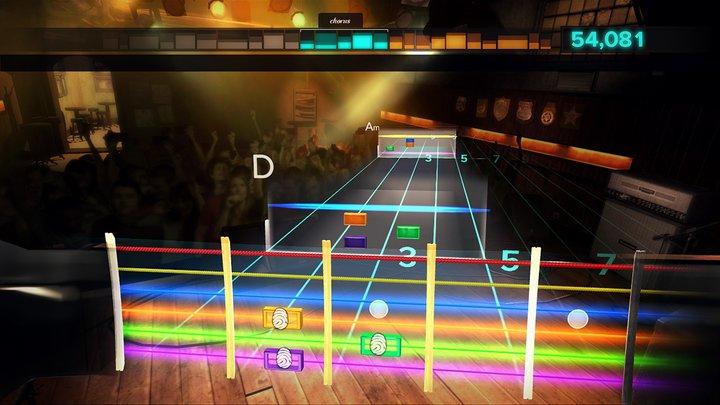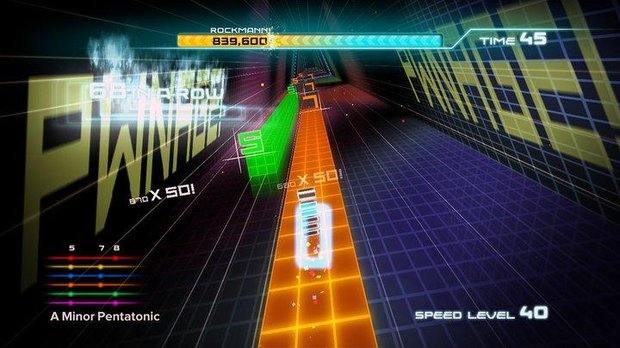GamesRadar+ Verdict
Pros
- +
Your 360 becomes an amp
- +
Interesting
- +
diverse song list
- +
Messing with loads of sounds
Cons
- -
Dull
- -
tired career mode
- -
Likely intimidating to newbies
- -
Hefty price of $80
Why you can trust GamesRadar+
Chris Cornell is wailing “Whoooo gets mystifiiiiiiiied” while we’re furiously fingerpicking during the bridge of Soundgarden’s masterpiece “Outshined.” Our eyes dart from TV to guitar and back; there’s an avalanche of orange, blue, and purple notes heading toward us. The intensity has ratcheted up, we’re sweating a little bit - and this is just rehearsal for our upcoming gig.

Rocksmith is many things: videogame, instructional device, six-string sandbox. What it does best is help those of us who play a decent guitar, but aren’t exactly Eddie Van Halen or Jimi Hendrix, get better (eventually). Thanks to the nifty cord that comes with the game, anyone can plug an electric guitar into their console of choice and strum their way through an impressive array of rock and roll tunes. What Rocksmith fails to do, however, is capitalize on this amazing technology and craft a truly compelling experience that envelopes a novice or expert guitarist. There’s plenty of fun to be had, but it could have been so much more.
There are two ways rock and roll guitarists learn their craft - they’re taught by the traditional methods of learning chords and scales and music theory, or they self-teach with the help of guitar tablature while playing along with their favorite bands’ songs. Rocksmith attempts to introduce a third way, borrowing heavily from the Guitar Hero franchise to do it. Unfortunately, because of the sheer size of a guitar’s neck and the fact that six strings are pretty complicated to map to colors, Rocksmith quickly becomes intimidating. While it’s possible to learn techniques like barre chords, slides, hammer-ons, and more, the on-screen methods won’t put you in position to plug in with a real garage band and turn it up to 11 for awhile. That doesn’t mean it’s not pretty cool or that you can’t learn some nifty licks; we certainly had some fun and discovered new things. It just doesn’t come together as a stand-alone teaching tool. You’ll need other avenues.

The tried-and-true “color highway” guides you on-screen for every song you’re playing. Anyone who’s played Guitar Hero will recognize it instantly, although it’s (naturally) larger and more complex because it’s covering the entire neck of a real guitar and the six strings that accompany it. For starters, you’ll plug in and show the game what you’re made of. If you’re an accomplished player, the game seems to eschew some of the basic instructions; if you’ve never played a guitar in your life, be prepared for some serious kindergarten-level discussions. Once you’ve established your chops, a career beckons. You’re given a set of songs to practice and then perform in front of a crowd; do well, and additional venues and gear are unlocked. Sound familiar? Of course it does. You’ve done that with plastic instruments a dozen times.
To be clear, Rocksmith is miles past any Fisher-Price toy-based game. Based on how you’re doing, song difficulty will dynamically change. You can’t fail out, either, which is fantastic. Naturally, if you miss enough notes, your score will reflect that and you’ll need to try again. Even so, Rocksmith is rather forgiving; whether it’s due to the quarter-second lag (which can be adjusted) or that there’s simply so much happening at once, it doesn’t take a superhuman effort to “pass” many songs. Practice, yes; perfection, no.

Our biggest problem, though, is the interface. Each of the six strings is assigned a color and allotted spot on the screen, along with a fret number. This is like learning a different language; our on-screen guide would constantly refer to “red” and “yellow” strings, even though we have known them for years as the “E” and “A.” As the song kicks in and notes come down the highway, it’s easy to get disoriented. With six strings and fifteen-plus frets, we consistently got lost moving from string to string, even on some of the earlier songs.
It wasn’t just our experienced guitarist, either. To further test Rocksmith’s claims that “anyone can play guitar,” we enlisted a true newbie to give it a go. We discovered that there’s nothing more intimidating than a Gibson Les Paul guitar in the hands of someone for the first time, and our friend was barely able to process what was happening on screen. The concept of the color-coded strings wasn’t his problem; rather, it was the constant looking up at the screen then down at the guitar and back again that threw him off time and again. There’s so much going on, it’s very hard for newbies to keep up.

So Rocksmith can be frustrating to experienced players and confusing to newbies – is all hope lost? No way. There’s a ton of interesting technology at work. Before every song, the game will prompt you to tune your guitar. Those of us lucky enough to have an ear for this will get annoyed over time, but others will appreciate that they won’t enter a new song with an out-of-tune instrument. Some songs have alternate tunings too – a nifty feature. What’s even cooler is that each song has a distinct sound that you automatically get handed. It’s great to strum the gritty sounds of Stone Temple Pilots and trademark Tom Petty jangle (among many others) without having to tinker with settings.
Another undeniably cool feature is the ability get out of the story mode and into a sandbox of sorts. You can kick around with a bunch of custom amp and pedal setups, experimenting with scads of sound combinations. As you unlock gear in the story mode, you can mix and match them at will; the amount of different tones you can produce is impressive. Unfortunately, there’s no way to turn pedals on and off while you’re strumming, so you’re kind of stuck with whatever’s coming through the amp until you go back in to make adjustments. Also, there’s no recording/upload feature that lets you save and promote any creations you come up with. Either of these would have made jamming for kicks a lot more fun.

At its core, Rocksmith is wildly cool, innovative technology sitting on top of a tired formula many of us have played to death. Had the story mode been anything other than the tried-and-true Guitar Hero/Rock Band “play a few songs, unlock new venues, rinse and repeat,” it would have been infinitely more fun. Even so, Rocksmith is undeniably interesting, and the potential for greatness in the franchise is there.
More info
| Genre | Rhythm |
| Description | Sizzling, innovative guitar technology that sits on top of a tired formula makes Rocksmith a tough call. Its undeniably fun in many ways, especially with the range of songs and sounds we tinkered with. Unfortunately, the main game mode is hard to be excited about, since that formula has been beaten to death. |
| Platform | "Xbox 360","PC","PS3" |
| US censor rating | "Teen","","Teen" |
| UK censor rating | "","","" |
| Release date | 1 January 1970 (US), 1 January 1970 (UK) |


